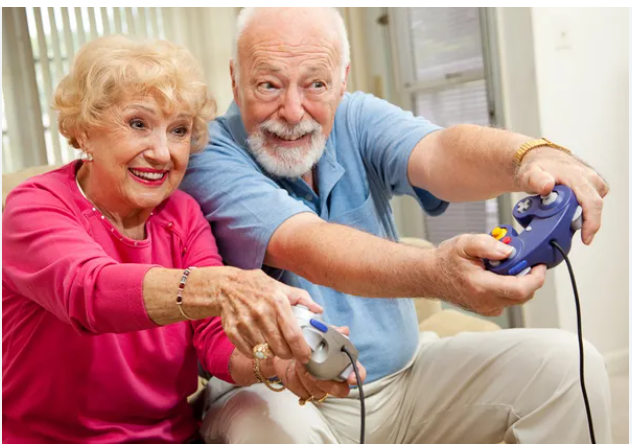Video Gaming in Aged Care
A very interesting study was recently reported by Caroline Riches in Technology, in Aged Care Insite (June 3, 2021). Whist we know that physical exercise helps older adults maintain fitness and cognitive function, a new study shows how a certain type of activity could be even more beneficial: active video gaming. We also know that falls are most common cause of death in aged care.
Caroline Riches is quoted below:
“We often consider gaming a pastime for the young, however research shows it may be the perfect hobby for older adults since it offers simultaneous physical and mental challenges, which may help to preserve memory.
The study, led by PhD student Udhir Ramnath at the University of Cape Town, compared the cognitive and physical function over 12 weeks of two groups of adults aged over 72 years with memory complaints.
One group of 22 participants took part in low-intensity standing and seated exercise; the other 23 attended two one-hour gaming sessions using the Xbox 360 console and Kinect Sports. The game tracks body movements via the Kinect camera peripheral, allowing participants to “play” several sports such as soccer and table tennis.
Those who played the game showed higher improvements in cognitive performance over the three-month period, compared to those who did conventional exercise. At the same time, they improved their physical performance, with significant increases in mobility, stability, balance and strength, which could help to reduce risks of falls
Active video gamers
Associate Professor Tracy Kolbe-Alexander at the University of Southern Queensland is also from Cape Town and was the senior author on the resulting paper, ‘Efficacy of interactive video gaming in older adults with memory complaints: A cluster randomised exercise intervention’.
She says the results prove active gaming is even more beneficial than traditional exercise because it involves simultaneous physical and mental challenges.
“In order to do well in the game, you need to remember certain sequences, you need to think about how you can improve your score, how you can move better, how you navigate the game,” she told Aged Care Insite.
“It requires visual-spatial skills, hand-eye or foot-eye coordination and quick decision making.”
Professor Kolbe-Alexander says she hopes the research will demonstrate how exercise with a cognitive load can help older Australians with memory complaints – and that this cohort should be seen as a potential active gaming audience.
“It would be great if aged care homes would be able to supply active gaming consoles and create an opportunity for residents to use them.”
She adds that playing active video games may allow older adults to overcome physical barriers to exercise, such as built-up suburbs and cities unsuitable for walking, distance from fitness centres, and oppressive heat.
One additional benefit of active gaming is harder to measure: connecting with family.
“Some of the participants said they would have something to speak about with their grandchildren,” Professor Kolbe-Alexander said.
“They can play these games together. It’s a way to connect those generations in a currency they both enjoy and understand.” End of quoted article. Caroline Riches, Technology June 3 Aged Care Insite





